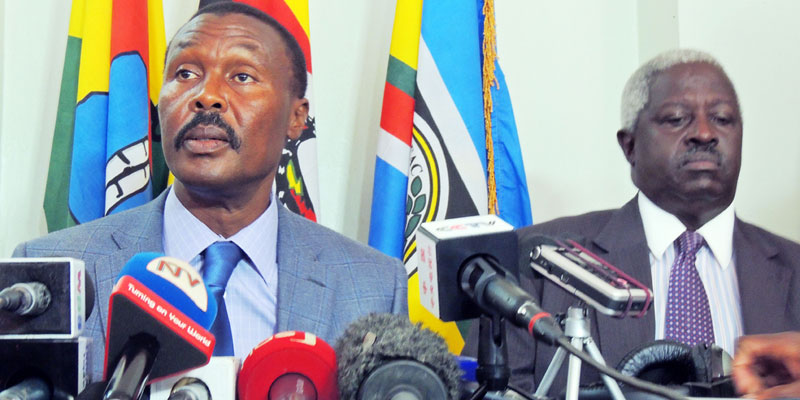News
Why unity government is still a distant dream

FDC president General Mugisha Muntu addressing the press where he revealed that FDC wants an independent audit for the presidential results
Uganda Farmers’ Party (UFP) representative in the recently concluded presidential elections Maj. Gen. Benon Biraalo is a man on a mission. He is trying to broker a deal that will hopefully bring Dr. Kizza Besigye to a negotiation table with the view to forming a government of national unity so as to save the country from descending into conflict.
A few days after the FDC leader rejected the declaration of President Museveni as the winner of the Feb 18, poll, Gen. Biraaro sought audience with Dr. Besigye to try to convince him into buying the idea of forming a government of national unity.
Gen. Biraaro’s idea seems to be gaining traction especially among his fellow presidential contenders. For example Dr. Abed Bwanika, Maureen Faith Kyalya Waluube, Prof. Venancious Baryamureeba and Elton Joseph Mabiriizi who have all indicated willingness to join a broad based government.
The proposal has also received strong backing from international bodies such as the Inter Government Agency on Development (IGAD) the regional body that brokered a power sharing deal and a coalition government in South Sudan recently.
“Tension is rising and the country is highly polarized,” said an IGAD top official. “To avoid a civil war like what is going on in South Sudan, we call upon the people of Uganda to immediately establish a government of national unity, after which fresh elections would be announced and conducted under UN supervision.”
Chances of success for the (power sharing) deal were however diminished by the seemingly irreconcilable differences between the two main principles in the dispute; President Museveni and his arch rival FDC leader Dr. Kizza Besigye.
Dr. Besigye was the first to rubbish Biraaro’s call for a transition government with Museveni when he maintained that the president lost the election on Feb 18, 2016 and is therefore illegitimate to share power since in his view, he does not have it in the first place.
Besigye said that whereas the idea (of a unitary government) is well enshrined in FDC’s manifesto and was also part of the Democratic Alliance (TDA) protocol to which he subscribed prior to the elections, “a unitary government under Yoweri Museveni’s presidency is untenable.”
Besigye argues that a power sharing deal is only possible if the sitting president holding power had won (the elections) genuinely.
“But Yoweri Museveni does not have any power to share in the first place because there is no genuine power he has won in the elections,” Besigye insisted.
In fact sources close to Besigye have told The Sunrise that Biraaro’s message to Besigye was meant to be a diversionary rather than a persuasive tool at a time Besigye focused on reminding the NRM leader ‘not to forget’ the rebellion that brought NRM to power.
Museveni also poured cold water to Biraaro’s idea while in Rwakitura following a meeting with Biraaro.
In addition, President Museveni recently dismissed voices of collaboration including those from IGAD.
Museveni argues that the IGAD’s proposal is presumptive of chaos and too far fetched since Uganda is neither South Sudan nor Kenya they (IGAD) are talking about.
“There is an ongoing war in the Sudan, Darfur and Nuba Mountains and Southern Blue Nile. When is IGAD going to establish a government of national unity in Khartoum? And there is a problem in Ethiopia between the government and the Oromo and Amharic people. Let IGAD call for a government of national unity in Addis Ababa first,” Museveni says.
He adds: “And will IGAD call for the same coalition government in Kenya next year or is this something applicable to South Sudan and Uganda only? This is outrageous. Where have they been since 1991 when Somalia imploded or are they afraid of Al-Shabab? Uganda is not South Sudan and IGAD must know that.”
Far from surprising, Museveni has also received support from his regional allies including South Sudan and Kenya’s Presidents Kiir and Uhuru Kenyatta who have openly condemned IGAD in the strongest terms, threatening to leave the regional body “if it does not respect the sovereignty of Uganda.”
Kiir said from his palace recently: “This proliferation of make-shift interim governments by IGAD is bad for Africa and is in the interest of the prophets of doom. It is killing democracy and seriously undermining the rule of law in Africa”
Nevertheless, believers in the dream of a unity government are calling for steadfastness despite reluctance from leaders.
Eric Kashambuzi, the Secretary General of the United Democratic Uganda (UDU), a U K based political pressure group compares Uganda’s leaders to those of South Africa where the unitary government dream was shunned when it was first mooted soon after the fall of apartheid.
“During the struggle to end apartheid in South Africa, some participants and outside commentators didn’t see the possibility of the two warring groups ever coming together to end the war and form a government of national unity,” Kashambuzi recalls.
He adds: “But common sense soon prevailed and the two opposing groups began since 1989 to discuss ending the war and the political system that created it. If South Africa could do it, so can Uganda. What we need is patriotic, visionary and dedicated leaders to bring it about.”
Comments


















